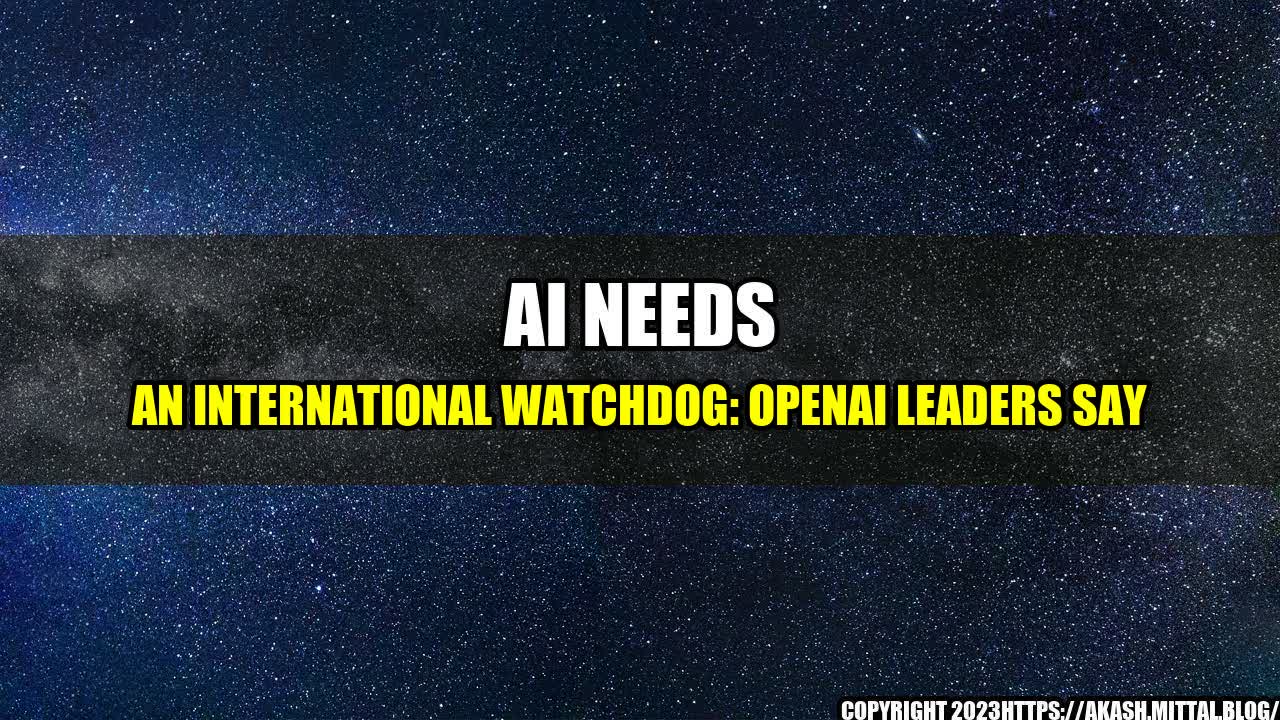
It was a hot summer day in July 2021 when the world witnessed an unprecedented event in the history of virtual assistants. The social media was abuzz with news about the controversial answer given by Alexa, Amazon's virtual assistant, to a user's question about the origin of the COVID-19 pandemic. Alexa's response triggered a heated debate, with experts questioning the reliability of the artificial intelligence (AI) systems.
This incident raises concerns about the unchecked use of AI and highlights the need for an international watchdog to monitor the development and deployment of these systems. OpenAI leaders are among the prominent voices advocating for such a watchdog to ensure the ethical and responsible use of AI.
The rapid advancements in AI technology have led to the deployment of intelligent systems across various industries, from healthcare to finance to retail. While AI has the potential to revolutionize these industries and improve the quality of life for millions of people, there are legitimate concerns about its unchecked use.
AI is already being used to make decisions that impact people's lives, such as credit scores, job hiring, and criminal justice sentencing. If AI systems are not carefully designed and monitored, they could replicate human biases and perpetuate discrimination and injustice.
OpenAI leaders believe that an international watchdog for AI is necessary to ensure that these systems are developed and deployed ethically and responsibly. The watchdog would be responsible for monitoring the development of AI systems, setting ethical and safety standards, and enforcing compliance with these standards.
The need for an AI watchdog is further reinforced by the examples of unchecked use of AI that have already caused harm. One such example is the case of autonomous vehicles, where the absence of clear regulations and safety standards has led to fatal accidents.
In 2018, an Uber self-driving car hit and killed a pedestrian in Arizona. Investigations revealed that the car's computer system had detected the pedestrian but had wrongly classified her as a false positive and failed to apply the brakes. This incident highlights the need for safety standards and regulations to mitigate the risks associated with autonomous vehicles.
Another example of unchecked use of AI is the development of facial recognition technology. Facial recognition is already being used by law enforcement agencies for surveillance and identification purposes. However, research shows that facial recognition algorithms are biased and can lead to false arrests and convictions, particularly for people of color.
The risks of unchecked use of AI are not just theoretical but also quantifiable. According to a report by the World Economic Forum, the rapid automation of jobs driven by AI and other digital technologies could displace 75 million jobs worldwide by 2022.
The report also highlights that the skills required for jobs are changing rapidly, and there is a growing skills gap between the demand for digital skills and the available talent. This trend could exacerbate income inequality and social unrest if not carefully managed.
Another quantifiable example is the economic impact of AI. According to a report by PwC, AI could contribute up to $15.7 trillion to the global economy by 2030. However, this economic growth could also exacerbate income inequality if the benefits of AI are not distributed fairly and if workers are not equipped with the skills needed to keep up with the changing job market.
An international watchdog for AI would have several important roles to play to ensure the responsible and ethical use of AI.
The watchdog would be responsible for setting safety, ethical, and technical standards for the development and deployment of AI systems. This includes developing guidelines for the use of AI in sensitive areas such as healthcare, criminal justice, and finance.
The watchdog would also be responsible for funding and conducting research on the impact of AI on society and the economy. This research would inform the development of policies and regulations to mitigate the risks associated with AI.
An important role of the watchdog would be to ensure compliance with the standards and regulations it sets. The watchdog would have the power to sanction companies or individuals that violate these standards and impose penalties for non-compliance. This would create a system of accountability and ensure that AI is developed and deployed responsibly.
The unchecked use of AI could have severe consequences for society, from perpetuating discrimination to exacerbating income inequality. An international watchdog for AI is necessary to ensure that these systems are developed and deployed ethically and responsibly.
An AI watchdog would play a critical role in setting standards and guidelines, conducting research and development, and enforcing compliance with regulations. It would create a system of accountability and ensure that the benefits of AI are distributed fairly and that the risks associated with AI are mitigated.
#AIwatchdog #OpenAIleaders #ethicsinAI #AIregulations #AIstandards #responsibletechnology
Technology and Ethics
Curated by Team Akash.Mittal.Blog
Share on Twitter Share on LinkedIn